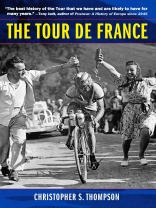In this highly original history of the world’s most famous bicycle race, Christopher S. Thompson, mining previously neglected sources and writing with infectious enthusiasm for his subject, tells the compelling story of the Tour de France from its creation in 1903 to the present. Weaving the words of racers, politicians, Tour organizers, and a host of other commentators together with a wide-ranging analysis of the culture surrounding the event—including posters, songs, novels, films, and media coverage—Thompson links the history of the Tour to key moments and themes in French history. He argues persuasively that this hugely popular sporting event has been instrumental in French attempts to grapple with the great challenges they have confronted during their tumultuous twentieth century—from World Wars, political divisions, and class conflict to economic modernization, women’s emancipation, and threats to public health. Examining the enduring popularity of Tour racers, Thompson explores how their public images have changed over the past century. He concludes with a discussion of the longstanding practice of doping and considers the complex case of the seven-time champion Lance Armstrong.
Table of Content
Acknowledgments
Introduction
1. La Grande Boucle: Cycling, Progress, and Modernity in Twentieth-Century France
2. Itineraries, Narratives, and Identities in Twentieth-Century France
3. The Géants de la Route: Gender and Heroism in Twentieth-Century France
4. L’Auto’s Ouvriers de la Pédale: Work, Class, and the Tour de France, 1903–1939
5. The Forçats de la Route: Exploits, Exploitation, and the Politics of Athletic Excess, 1903–1939
6. What Price Heroism? Work, Sport, and Drugs in Postwar France
Epilogue
Appendix: Racers’ Occupations
Notes
Bibliography
Index
About the author
Christopher S. Thompson is Associate Professor of History at Ball State University.












